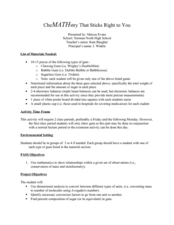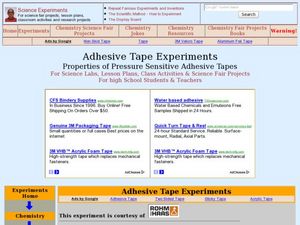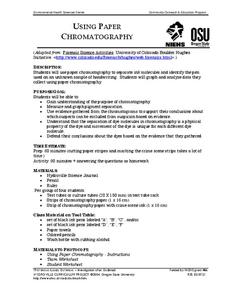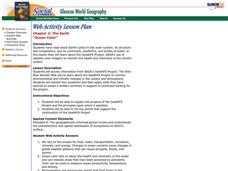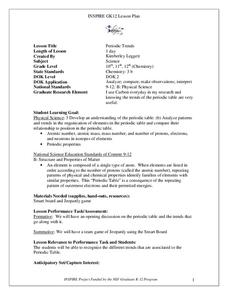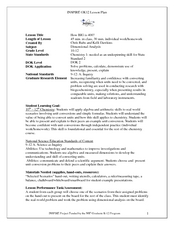Curated OER
The Periodic Table
These slides introduce the basics of the Periodic Table structure and the history and reasoning behind its organization. A useful chart on the fifth page gives the main properties and differences between metals, non-metals and...
Curated OER
Chemistry World The Five Types of Chemical Reactions
Students research five types of chemical reactions in order to design a learning center. Students use technology to research and present their material.
Curated OER
Sunrise/Sunset
Third graders discovver what causes the dramatic colors of a sunset by seeing the changing color of light as it passes through a clear container of water to which milk is gradually added. They measure the liquids and observe what happens...
Curated OER
Water and Polymers
Students conduct qualitative and quantitative investigations based on the interaction between water and various polymers. They determine the percent moisture contained in various plastics along with a qualitative procedure to determine...
Curated OER
Models of Chemical Families
A simple activity for introductory chemistry classes is thoroughly explained in this lesson plan. Each individual receives a sealed box containing an unknown object. Inquisitors use indirect evidence to draw conclusions. This activity is...
Curated OER
Polyatomic Ions
Opening with a chart of common polyatomic ions, and finishing with an explanation of how to name polyatomic ions, this presentation is to the point. The links on the vocabulary page do not work, leaving you only a few slides to...
Curated OER
Environmental Concerns (1) Analysis of Lead in Paint (2) Analysis of Water
A scenario and background information are provided for two different open-ended experiments that experienced chemistry classes can perform toward the end of the school year. In the first, they design a method for testing flakes of paint...
Curated OER
Scientific Investigation of Sea Ice Thickness
Students study the importance of global ocean currents, sea water chemistry, and cultural issues surrounding sea ice. In the field, students travel to the floe edge with their teacher and an elder to drill holes in the ice and measure...
Curated OER
CheMATHstry That Sticks Right to You
Students find the percent composition of sugar in the gum. In this chemistry lesson plan, students calculate percent error from the experiment. They use dimensional analysis to convert between units.
Curated OER
"Stick to It!" Properties of Pressure Sensitive Adhesive Tapes
Students investigate the strength of different adhesives. In this physical science lesson plan, students compare the force needed to peel adhesive tapes from a surface. They analyze collected data and make a generalization.
Curated OER
Water
Students conduct a series of investigations on the unique properties of water. For this general science lesson, students explain what causes water's surface tension. They explain the different stages in the water cycle.
Curated OER
Periodic Table of Elements Project
Students research an element from the Periodic Table in groups of two and incorporate several forms of technology. Students must select a form of presentation of their researched information, which is guided by a rubric. Students are...
Curated OER
Unknown Element Project
High schoolers work with a partner to determine the identity of an unknown element based on given descriptions. Groups use classroom textbooks, encyclopedias, and science internet sites to identify their unknown element then write a...
Curated OER
Math, Chemistry, and Food
Students explore the effects of chemical reactions when cooking. Using the Internet, they research enzymes and then mix jello. They examine their results and test enzyme activity by adding pineapple to the jello. Finally, they test...
Virginia Department of Education
Elements and Electron Configuration
It's electronic! Pupils uncover elements and their electron configurations as they explore mass, groupings, correct charges, and sliding theory. Young scientists learn creative ways to remember various elements and correctly...
Pingry School
Synthesis of an Insoluble Ionic Salt: A Stoichiometry Experiment
Challenge young scientists to design their own experimental procedures. They write the procedure for properly preparing two grams of a water-insoluble ionic salt. To finish, they perform the experiment and collect data to prove their...
Oregon State
Using Paper Chromatography
Through the analysis of paper chromatography to separate ink from the pen found at the crime scene, learners analyze the different stains and through calculations determine the thief.
Curated OER
Ocean Color
Learners examine NASA's SeaWiFS Project Web site to explore how the SeaWiFS Project monitors environmental and climatic changes in the oceans and atmosphere. They answer questions and write a summary in support of continued funding for...
Curated OER
Periodic Trends
Students identify the different periodic trends. In this chemistry lesson, students discuss how elements are arranged in the periodic table. They apply what they have learned in a Jeopardy team game.
Curated OER
Periodic Table Patterns using Fabulous Periodic
Students explain how elements are arranged in the periodic table. In this chemistry lesson, students group the eggs according to a certain pattern. They compare this to elements in the periodic table.
Curated OER
You say Avocado, I say Avogadro
Students convert mole to mass to particles and vice versa. In this chemistry activity, students discuss the importance of Avogadro's number. They apply what they have learned in a team competition.
Curated OER
Science with Mud!
Eighth graders give some examples of chemical reactions they see everyday. In this chemistry lesson, 8th graders investigate how much water soil can hold. They collect data and compare results with others.
Curated OER
Rain Forests: Sustainable Use
Students discuss their opinion on a teacher given scenario. In this chemistry lesson, students research the value of rainforests. They relate these ideas to current forestry practices.
Curated OER
How BIG is 400?
Students solve problems using dimensional analysis. In this chemistry lesson, students choose a problem and present it in class. The rest of the class will evaluate the solved problem on the board.








